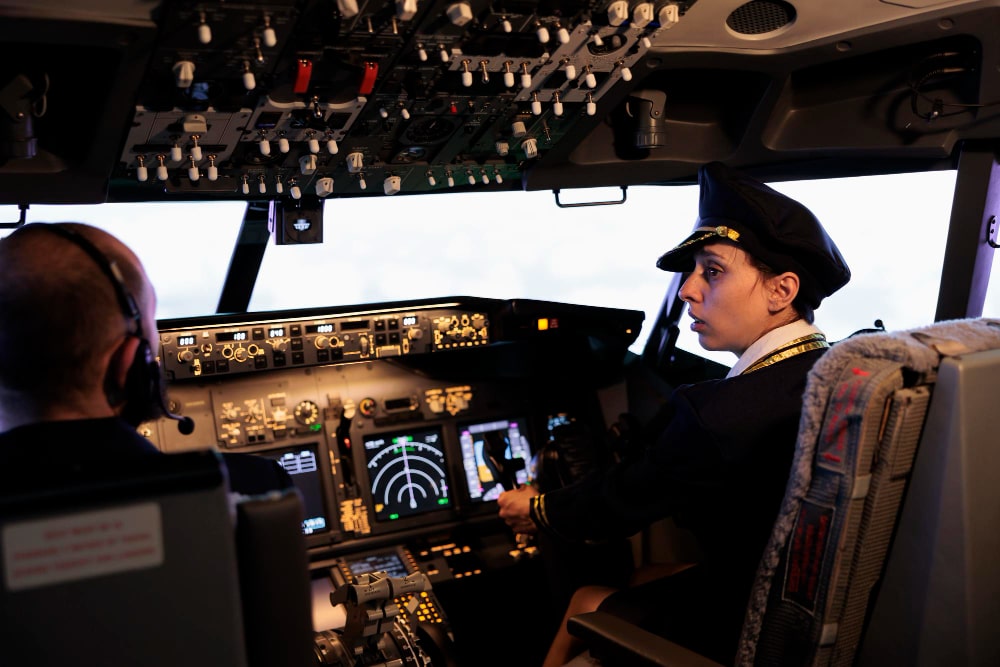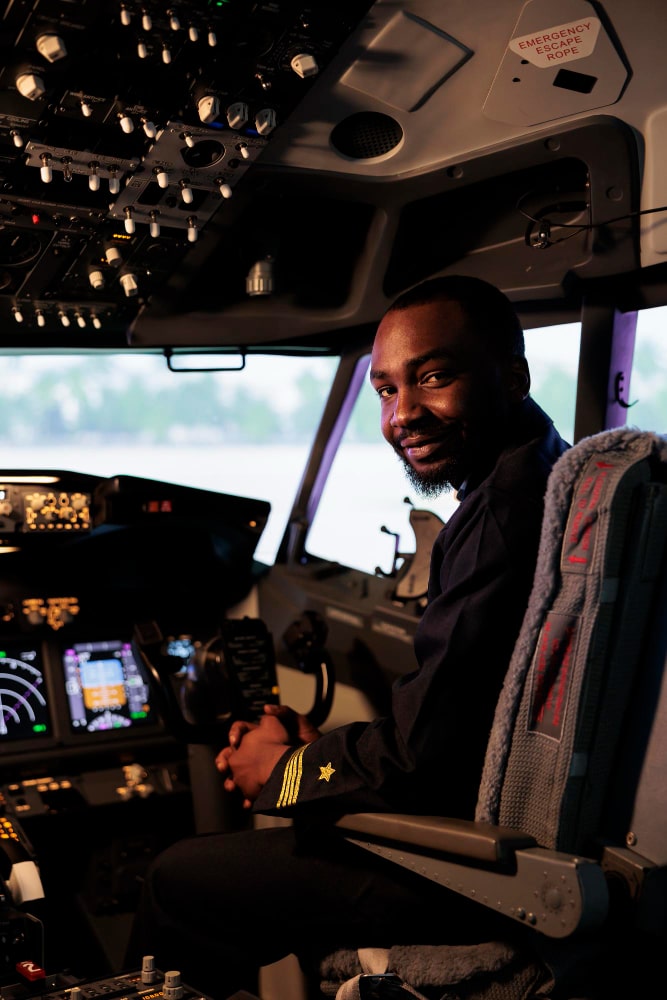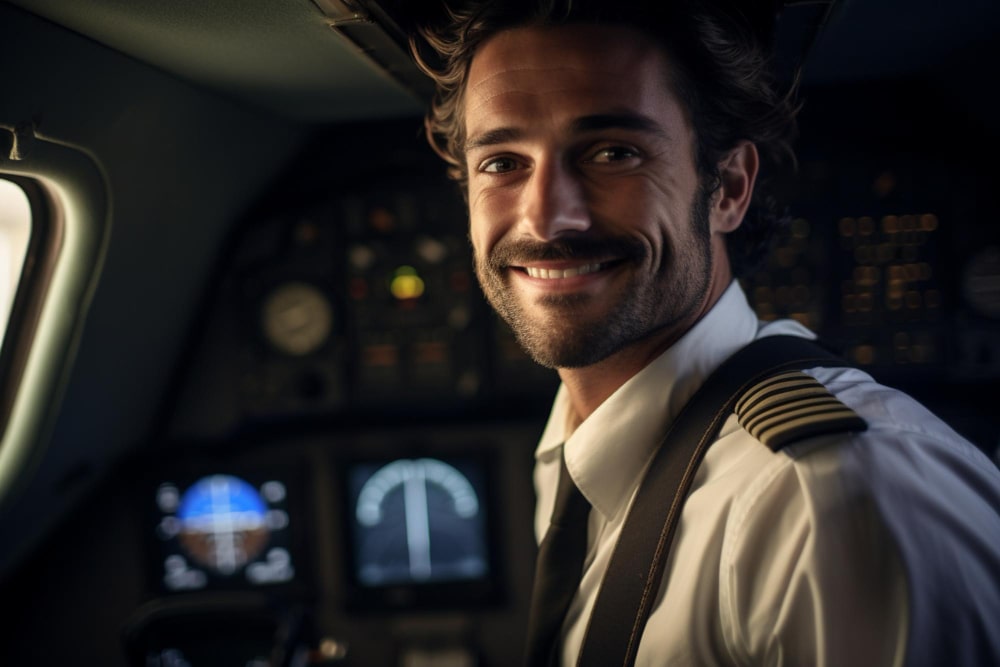Being a pilot requires not only technical skills and knowledge but also optimal physical fitness that allows the pilot to respond effectively to the demands of the job. Maintaining good physical condition is crucial for flight safety and the pilot’s personal well-being. In this article, we will explore in detail how pilots can achieve and maintain this optimal physical condition, as well as how they can train at EAS – European Aviation School to be prepared both physically and mentally.
The Importance of Physical Fitness for Being a Pilot
Being a pilot involves long periods of concentration, the ability to make quick decisions, and considerable physical endurance, especially on long-haul flights or under adverse weather conditions. A pilot in good physical condition can maintain consistent performance, manage stress more effectively, and reduce the risk of fatigue, which is one of the leading causes of errors in the cockpit.
Optimal physical fitness not only refers to the absence of illnesses or medical conditions that could interfere with a pilot’s performance but also to being in good overall physical shape, with an adequate level of strength, endurance, and flexibility. Maintaining this physical condition is an integral part of flight preparation and should be taken as seriously as any other aspect of training.
Impact of Fatigue and Stress on Pilot Performance
One of the main risks to aviation safety is fatigue. Pilots are subject to irregular work schedules, time zone changes, and long periods of inactivity followed by moments of high intensity, which can contribute to the development of chronic fatigue. This condition can significantly reduce a pilot’s ability to concentrate, make decisions, and react quickly to unforeseen situations.
Stress, both acute and chronic, also negatively impacts pilots’ performance. Stressors can come from various sources, such as work pressure, personal problems, or even the complexity and responsibility inherent in being a pilot. A pilot in good physical condition, with a focus on mental health, will be better able to manage stress effectively and maintain optimal performance in the cockpit.

How to Achieve and Maintain Optimal Physical Fitness to Be a Pilot
To achieve optimal physical fitness that allows pilots to perform efficiently, it is essential to follow a regular physical training routine, maintain a balanced diet, and pay attention to mental health. These aspects, combined with adequate rest and recovery, form the foundation of good physical fitness for those who aspire to be a pilot.
Physical Exercise: An Essential Component
Regular physical exercise is vital to maintaining optimal physical fitness. For pilots, a fitness program should include cardiovascular training, strength and endurance exercises, as well as activities that enhance flexibility and balance. Here’s how each of these components contributes to a pilot’s performance:
- Cardiovascular training: Maintaining good cardiovascular health is essential for pilots as it improves endurance and lung capacity, which is especially important on long flights. Activities like running, swimming, or cycling are excellent for this purpose.
- Strength training: Muscle strength is necessary for handling the aircraft controls, especially in emergency situations. Resistance exercises with weights, resistance bands, or even bodyweight exercises can help maintain an adequate level of strength.
- Flexibility and balance: Flexibility helps prevent injuries and allows the body to move more freely and effectively. Yoga and regular stretching are excellent for improving flexibility. Balance, on the other hand, is crucial for maintaining stability in turbulent situations or complex maneuvers.
Nutrition: The Foundation of Good Physical Fitness
A balanced and proper diet is fundamental to maintaining optimal physical fitness. Pilots should pay special attention to their diet, ensuring they consume enough calories to sustain their energy, as well as a variety of essential nutrients to support overall health.
- Complex carbohydrates: These provide the energy needed to maintain performance during long flights. It is recommended to opt for healthy sources like whole grains, fruits, and vegetables.
- Proteins: Essential for muscle repair and growth. High-quality proteins can be found in lean meats, fish, eggs, and legumes.
- Healthy fats: Fats are not only an important source of energy but are also necessary for the absorption of certain vitamins. Sources like nuts, avocado, and olive oil are recommended.
- Hydration: Staying well-hydrated is crucial, especially on long flights where the cabin environment tends to be dry. Excess caffeine and alcohol should be avoided as they can contribute to dehydration.
Mental Health: Just as Important as Physical Health
Mental well-being is an integral part of optimal physical fitness. Pilots should be aware of the importance of mental health and take steps to manage stress and anxiety. Psychological support, meditation, and relaxation techniques can be effective tools to maintain calm and focus in high-pressure situations.
Rest and Recovery
Adequate rest is crucial for the body and mind to recover after long periods of activity. Pilots should ensure they get enough and high-quality sleep, as lack of sleep can lead to a significant decrease in cognitive and physical performance.
Additionally, it is advisable to include relaxation practices and recovery techniques in the daily routine, such as massages, gentle stretching, and warm baths, which can help reduce muscle tension and improve circulation.
Training at EAS – European Aviation School being a Pilot
 Training at EAS – European Aviation School not only focuses on the technical aspects of piloting but also places special attention on the physical and mental preparation of those who aspire to be a pilot. The school offers a comprehensive approach to ensure that students not only acquire the necessary technical skills but also develop optimal physical fitness.
Training at EAS – European Aviation School not only focuses on the technical aspects of piloting but also places special attention on the physical and mental preparation of those who aspire to be a pilot. The school offers a comprehensive approach to ensure that students not only acquire the necessary technical skills but also develop optimal physical fitness.
Physical Training Programs
At EAS – European Aviation School, physical training programs are designed to complement pilots’ technical training. Students have access to facilities and receive guidance on how to create and maintain a fitness regimen that suits the specific demands of their career. The training focuses on improving cardiovascular endurance, muscle strength, and flexibility, ensuring that pilots are prepared for the physical demands of flight.
Nutrition and Healthy Habits
Training at EAS also includes education on nutrition and healthy habits. Students learn about the importance of a balanced diet and how different types of food can affect their performance. They are provided with guidance to develop eating habits that help them maintain optimal physical fitness throughout their careers.
Psychological Support and Stress Management
Recognizing the importance of mental health, EAS – European Aviation School offers psychological support programs that help students develop tools to manage stress and pressure. The practice of relaxation techniques, such as meditation and deep breathing, is encouraged, which can be particularly useful in critical moments during the flight.
Simulators and Training in High-Pressure Conditions
An essential part of training at EAS is the flight simulators that allow students to experience and manage high-pressure situations in a controlled environment. These simulators not only improve technical skills but also allow pilots to develop the mental resilience needed to remain calm and efficient in real-life situations.
Maintaining Optimal Physical Fitness Throughout a Pilot’s Career
The commitment to optimal physical fitness does not end once pilots have completed their training at EAS – European Aviation School. Throughout their careers, pilots must continue to dedicate time and effort to maintaining their physical and mental condition.
Regular Medical Assessments being to pilot
Pilots are subject to regular medical evaluations to ensure they are in optimal physical fitness to fly. These assessments not only detect potential health issues but also provide an opportunity for pilots to receive advice and guidance on how to improve their physical condition.
Continuous Update on Physical and Mental Training
Aviation is a constantly evolving field, and pilots must stay updated not only on technical aspects but also on best practices for maintaining their optimal physical fitness. This can include participating in workshops, seminars, and continuing education programs that address physical and mental health.
The Importance of the Pilot Community
Finally, being part of a pilot community can be a valuable resource for maintaining optimal physical fitness.
Sharing experiences, advice, and mutual support with colleagues can motivate pilots to continue their physical and mental development and to seek help when needed.
In summary, maintaining optimal physical fitness is essential for anyone who wishes to be a pilot and perform safely and efficiently in their career.
